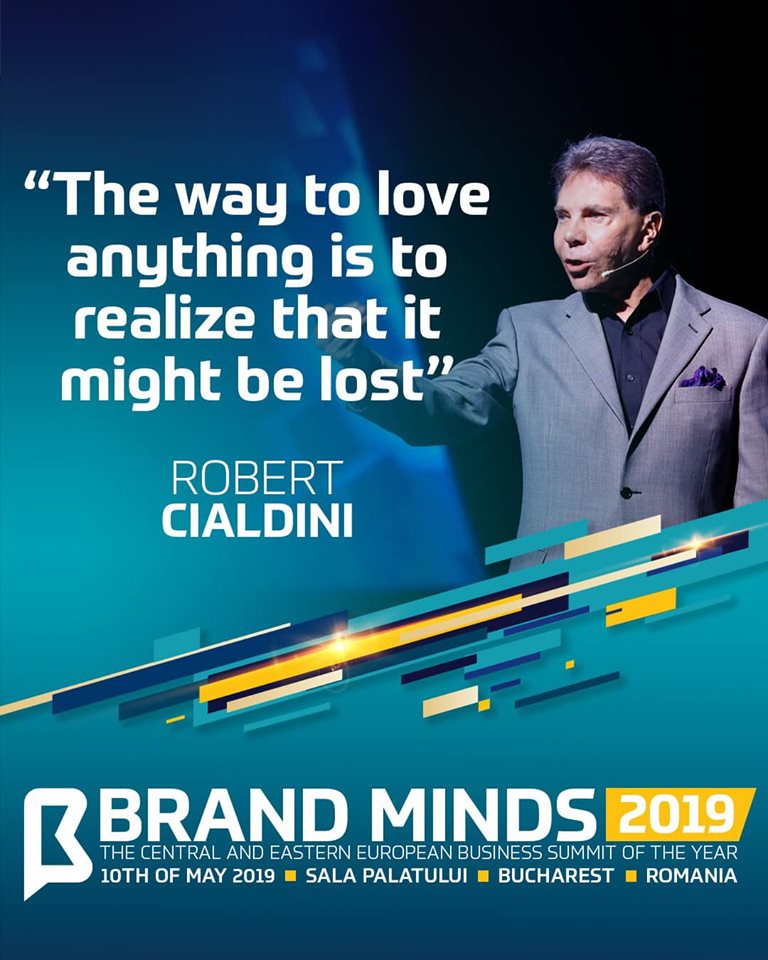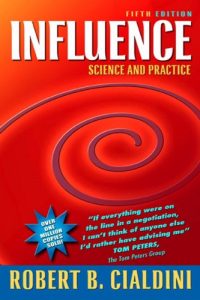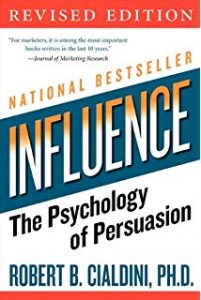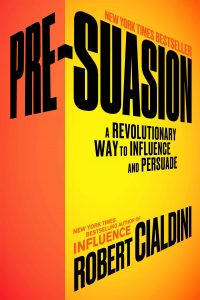Dr. Robert Cialdini at BRAND MINDS
Dr Robert Cialdini is the world’s most renowned persuasion expert and he was a speaker at BRAND MINDS 2019.
BRAND MINDS is The Central and European Business Summit taking place in Bucharest, Romania.
He is one of the #worldchangers we look up to and admire: his work in the science of influence has led to improvements in many fields such as sales, design, online marketing, business, psychology etc.

Award-winning psychologist
Dr Cialdini received his PhD from the University of North Carolina and post doctoral training from Columbia University. He has held different talks at the Graduate School of Business of Stanford University, the Ohio State University, the University of California and the Annenberg School of Communications.
He was a visiting professor of marketing, business and psychology at Stanford University.
Currently, Dr Cialdini is Regents’ Professor Emeritus of Psychology and Marketing at Arizona State University.
Over the course of his career, he received numerous awards for his extended work on influence:
- Distinguished Member Award for Outstanding Contributions to the Field of Psychology from Psi Chi: The National Honors Society in Psychology (2006);
- Distinguished Service to the Discipline of Personality and Social Psychology from the Society of Personality and Social Psychology (2008);
- Distinguished Scientist Award of the Society of Experimental Social Psychology (2009);
- Western Psychological Association Lifetime Achievement Award (2016).
Get in the habit of helping people out, and don’t wave it away and say, “Oh, no big deal.” We have serious persuasive power immediately after someone thanks us.
Best-selling author
He is the author of Influence: Science & Practice and Influence: The Psychology of Persuasion, which has been sold in over 3 million copies and has been published in 30 languages. His books are listed on the New York Times’ Best Seller list, Fortune’s 75 Smartest Business Books list and USA Today’s 12 Best Business Books of All Time.
His co-authored book, Yes! 50 Scientifically Proven Ways to be Persuasive has been on the New York Times, USA Today and Wall Street Journal’s Best Seller Lists.
His latest insights on persuasion are in his 2016 book Pre-Suasion: A Revolutionary Way to Influence and Persuade.
People seem to be more motivated by the thought of losing something than by the thought of gaining something of equal value.
Founder of Influence at Work (IAW)
Dr Cialdini founded Influence at Work, his professional resource to improve organisational and personal performance by understanding and using the psychology of influence. IAW offers interactive training and a certification program; it also provides its clients with strategies that drive business success.
He worked with 1st tier companies
Dr. Cialdini’s clients include such organizations as Google, Microsoft, Cisco Systems, Bayer, Coca Cola, KPMG, AstraZeneca, Ericsson, Kodak, Merrill Lynch, Nationwide Insurance, Pfizer, AAA, Northern Trust, IBM, Prudential, The Mayo Clinic, GlaxoSmithKline, Kimberly-Clark, Harvard University – Kennedy School, The Weather Channel, the United States Department of Justice, and NATO.

Robert Cialdini on the stage at BRAND MINDS
Also known as The Godfather of Influence, Dr Cialdini is the most cited living social psychologist in the world.
Robert Cialdini is the Benjamin Franklin of research on influence–a keen observer of human nature, great writer, minter of pithy phrases, and clever experimenter who’s able to capture lightning in a jar.
Chip Heath
Professor, Stanford Graduate School of Business, Author of Made to Stick
Cialdini’s Theory of Influence
Cialdini’s theory of influence is based on seven key principles: reciprocity, commitment and consistency, social proof, authority, liking, scarcity, unity.
Let’s take a closer look at the principles that guide human behaviour:
- Reciprocity: If you give people something — a free sample, an invitation, a pleasant experience, useful information, etc. — they will feel obligated to give you something in return;
- Commitment and consistency: People like to be consistent with the things they have previously said or done;
- Liking: People prefer to say yes to those that they like;
- Scarcity: We want more of things that are less of;
- Authority: People will follow credible knowledgeable experts;
- Social proof: People will look to the actions of others to determine their own;
- Unity: People identify themselves with others.
Looking to upgrade your persuasion strategy?
Learn the secret science of viral ideas from Viral Marketing Expert Jonah Berger at BRAND MINDS 2022!



